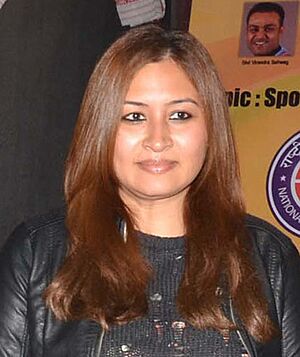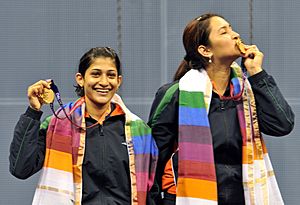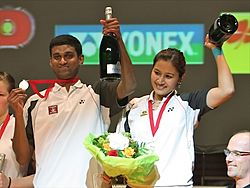Jwala Gutta facts for kids
Quick facts for kids Jwala Gutta |
|
|---|---|

Gutta in 2015
|
|
| Personal information | |
| Born | 7 September 1983 Wardha, Maharashtra, India |
| Residence | Hyderabad, Telangana, India |
| Height | 1.78m |
| Weight | 75 kg |
| Country | India |
| Years active | 1999–2017 |
| Handedness | Left |
| Mixed Doubles/ Women's Doubles | |
| Highest Ranking | 6 (XD August 2010) 10 (WD August 2015) |
Jwala Gutta (born September 7, 1983) is a famous Indian badminton player. She played for India in international events, mostly in mixed and women's doubles. She has won 316 matches, which is the most by any Indian player. She even reached a world ranking of No. 6. Jwala has won many medals at big tournaments, including a silver at the 2009 Superseries Masters Finals and a bronze at the 2011 World Championships.
Jwala was born in Wardha to a Chinese mother and an Indian father. She started playing badminton when she was very young. She won the National Champion title fourteen times! Early in her career, she played with Shruti Kurien-Kanetkar. Later, she found even more success with Ashwini Ponnappa. This pair often ranked among the top twenty in the world, reaching No. 10 in 2015. Jwala is the first Indian badminton player to qualify for two events at the Olympics. She played women's doubles with Ashwini Ponnappa and mixed doubles with V. Diju at the London 2012 Olympics. Jwala is known for her strong left-handed shots and is one of the few doubles players who uses a forehand serve.
Jwala Gutta has won many important medals for Indian badminton. These include a bronze medal at the 2011 World Championships in London. She also won a gold medal at the 2010 Commonwealth Games and a silver at the 2014 Commonwealth Games in women's doubles. These were the first medals for India in this event. Other big achievements include a bronze medal at the 2014 Uber Cup in New Delhi. She also won a bronze medal at the Badminton Asia Championships in the same year. She reached the finals and semifinals of many other international events.
Jwala is known for making doubles badminton popular in India. First, she and her mixed doubles partner Diju reached No. 6 in the world in 2010. This was the first time an Indian doubles team was ranked in the top 10. Later, her partnership with Ponnappa in women's doubles also became very successful. She played with Ponnappa at the 2016 Rio Olympics. They did not make it past the group stage. Jwala has won medals at almost all major international badminton tournaments, except the Olympics.
Besides playing badminton, Jwala Gutta has spoken out about important issues. She supports fair treatment in sports, health, education, and equality for women. She has been named one of India's most inspiring sportswomen many times. She received the Arjuna Award, which is India's second-highest sports award. Jwala was married to badminton player Chetan Anand from 2005 to 2011. In 2017, she thought about retiring and possibly becoming a coach.
Contents
Early Life and Junior Career
Jwala Gutta was born on September 7, 1983, in Wardha, Maharashtra. She grew up in Hyderabad, Telangana. Her father, Kranti Gutta, was from Andhra Pradesh. Her mother, Yelan Gutta, was born in China. Yelan first came to India in 1977. Jwala has a younger sister named Insi Gutta.
Jwala first wanted to play tennis. But her mother encouraged her to try badminton. When she was four, her father introduced her to national badminton coach S. M. Arif. Arif suggested she learn gymnastics or swimming first. Later, Jwala started training under Arif at the Lal Bahadur Shastri Stadium.
Jwala started playing badminton at age six. Her biggest win as a young player was the Under-13 Girls Mini National Badminton Championship. In 2000, when she was 17, Jwala won the Junior National Badminton Championship. That same year, she also won the Women's Doubles Junior National Championship and the Senior National Badminton Championship. She won both with her partner Shruti Kurien. Jwala and Shruti Kurien won the Women's Doubles National title for seven years in a row, from 2002 to 2008.
Playing Style and Strengths
Jwala Gutta likes to play aggressively in badminton. She is very good at playing near the net. She can anticipate what her opponents will do and hit tricky shots. She is considered dangerous in the front court because she reads the game well and makes quick interceptions. Jwala also has a powerful smash from the back of the court. She often uses deceptive drop shots.
Jwala is known for being one of the only top doubles players who still uses a forehand serve. Most other doubles players use a safer backhand serve. This makes her unique.
Women's Doubles Success
Early Years: 2002–2009
Jwala Gutta first partnered with Shruti Kurien-Kanetkar for women's doubles. They reached the semifinals of their second international tournament, the India Asia Satellite tournament in 2002. They also reached the semifinals of the same tournament in 2004. They were runners-up at the Le Volant d'Or Tournament in 2004. In 2006, they won the Sri Lanka International Satellite tournament. In 2007, they won the Cyprus Badminton International tournament, the Pakistan International Challenge, and the Indian International Challenge. Jwala also won the Nepal International Series tournament in 2008 and the Yonex Dutch Open Grand Prix in 2008 in women's doubles.
2010: Commonwealth Gold and Big Breakthrough
Jwala then started playing with Ashwini Ponnappa from Bangalore. They won a gold medal in women's doubles at the New Delhi Commonwealth Games. This was a historic moment, as it was India's first gold medal in this event. They beat the higher-ranked Singaporean pair of Shinta Mulia Sari and Yao Lei. The score was 21–15, 21–19. Jwala and Ashwini became very popular after this win. They helped bring attention to women's doubles in India.
After their win, Jwala said, "It's unbelievable. I am very emotional. Ashwini played incredibly well. We hope to keep doing well." She also said, "This medal will silence my critics. This is my answer to them."
2011: World Championships Bronze
In 2011, Jwala and Ashwini made history again. They became the first Indian pair to win a medal at the World Badminton Championships. They defeated a strong Indonesian pair to reach the semifinals. They then lost to a Chinese pair in the semifinals in London. This earned them a bronze medal at the Badminton World Championship. They had also beaten the second-seeded team from Chinese Taipei earlier in the tournament. This achievement was ranked as one of the greatest in Indian badminton.
2012: London Olympics
Jwala played in both women's doubles and mixed doubles at the 2012 London Olympics. She was the first and only Indian player to qualify for two events in badminton at the Olympics. Jwala and Ashwini Ponnappa lost their first women's doubles match to a Japanese team. However, they then beat a higher-ranked team from Chinese Taipei. They also won their last group match against Singapore.
Even though they won two matches, Jwala and Ashwini just missed out on reaching the quarterfinals. This was due to a tie-breaker rule. India protested a match between Japan and Chinese Taipei, but no action was taken. After the Olympics, Jwala took a short break from the game.
2013: Comeback and IBL
In January 2013, Jwala announced she was returning to badminton. She partnered with Prajakta Sawant for a while. Later that year, the Indian Badminton League (IBL) was launched. It was a new professional league. Jwala was one of the main players and team captains.
There was some disagreement about player prices and changes to the game format in the IBL. Jwala and Ashwini Ponnappa were upset when the women's doubles category was removed. Jwala was bought by the Delhi franchise and became their captain. After the IBL, Jwala and Ashwini decided to play together again. Jwala said they reunited because the IBL had removed the women's doubles category.
2014: Asian and Uber Cup Bronze, CWG Silver
In 2014, Jwala and Ashwini won a bronze medal at the Badminton Asia Championships. They played a big part in India winning a historic bronze medal at the Uber Cup in New Delhi. They beat many higher-ranked opponents. Their biggest win was against the World No. 9 team from Indonesia. This win helped India reach the semifinals of the Uber Cup for the first time. This guaranteed them a bronze medal.
They also played at the 2014 Commonwealth Games. They won a silver medal in women's doubles, losing a close final to a Malaysian pair. This was their second medal at the Commonwealth Games, after their gold in 2010.
2015: Canada Grand Prix Title and Top-10 Ranking
Jwala and Ashwini started 2015 by reaching the semifinals of the 2015 India Open Grand Prix Gold. They also played in the famous All England Open. After this, they re-entered the top 20 world rankings.
In May, Jwala played for India at the 2015 Sudirman Cup. Jwala and Ashwini played very well, beating a strong Malaysian pair.
Later, Jwala and Ashwini won the title at the 2015 Canada Open Grand Prix. They beat a Dutch pair in the final. This was their first title since they started playing together again after the 2012 Olympics. Indian media praised their win. Jwala also spoke about the need for more support for doubles players in India.
They continued their good form and reached the quarterfinals of the 2015 BWF World Championships. They beat the world No. 6 Japanese pair. They just missed out on a bronze medal, losing to another Japanese pair. This quarterfinal finish helped Jwala and Ashwini enter the top 10 in the world rankings for the first time. Jwala became the first Indian player to be ranked in the top 10 in both women's doubles and mixed doubles.
2016: Premier Badminton League and Second Uber Cup Bronze
Jwala started 2016 playing for the Hyderabad Hunters in the Premier Badminton League. She played mixed doubles with different partners. Her team did not make it to the knockout stage.
In May, Jwala was part of the Indian team for the 2016 Thomas & Uber Cup in China. The Indian women's team won against Germany and Australia. They lost to Japan but still finished second in their group. In the quarterfinals, they beat Thailand. Jwala and Ashwini won their match easily, helping the team reach the semifinals. This earned the team its second bronze medal in a row at the Uber Cup. However, the Indian team was then beaten by China in the semifinal.
Mixed Doubles Performance
Early Years
Jwala has won titles in mixed doubles too. These include the Jakarta Satellite tournament and Welsh International tournament in 2005. She also won the Sri Lanka International Satellite tournament, Cyprus Badminton International tournament, and Indian International Challenge tournament in 2007. In 2008, she won the Nepal International Series tournament, Bitburger Open Grand Prix, and KLRC Bulgaria Open Grand Prix.
Success and Top-10 Ranking
A big moment came when Jwala and her partner Valiyaveetil Diju became the first Indian mixed doubles pair to win a Grand Prix Gold title. They defeated an Indonesian pair in the Chinese Taipei Open final in 2009. They also beat strong Korean and Malaysian pairs on their way to the final.
Their biggest achievement that year was reaching the quarterfinals of the 2009 BWF World Championships. This was the first time an Indian mixed doubles pair had done this. They repeated this feat the next year. The 2009 Championships were held in Hyderabad, India. They beat a Polish pair in the third round. In the quarterfinals, they lost to the defending champions from Indonesia.
In the same year, they reached the finals of the BWF Super Series Masters Finals. This is a special tournament where only the top players compete. They beat the Polish pair again. In the final, they lost to a Danish pair. By reaching the finals, they became the first Indians to achieve this in any of the five badminton categories.
In 2010, the pair reached the quarterfinals of the World Championships for the second year in a row. They also won the 2010 India Open Grand Prix Gold, which was their second Grand Prix Gold title. In 2011, Jwala and Diju reached the semifinals of two big tournaments, the Denmark Open and China Masters.
2012 Olympics and Break
Jwala and Diju reached two quarterfinals in 2012 before competing at the 2012 Summer Olympics. At the London Olympics, they lost their opening match and their next two matches. They did not qualify for the knockout stage. Even though they had been very successful in mixed doubles, Jwala later focused more on women's doubles. In March 2016, Jwala announced she would return to mixed doubles. She said she missed winning titles with V. Diju. She looked for a new partner and planned to start playing again in April.
Personal Life and Other Work
Jwala Gutta was married to fellow badminton player Chetan Anand from 2005 to 2011. They divorced in 2011.
Jwala has supported many social causes. These include helping women, promoting health and education, and fighting against tobacco. She has also been part of campaigns like the Ice Bucket Challenge and Swachh Bharat Abhiyan. Jwala also helped launch a school badminton program called 'Shuttle Express' for children. She said, "I am really happy to be here with the kids who are playing not only to win the Shuttle Express but to be the next badminton champion for India."
In 2013, she had a small role in a song in a Telugu film. Jwala has said she is an atheist.
Jwala Gutta started dating Tamil film actor Vishnu Vishal. They shared pictures on social media in 2020. They got engaged on her birthday in 2020. They were married on April 22, 2021, in Hyderabad. They had a daughter.
In the Media
Jwala Gutta has often been called one of India's most inspiring sportswomen. She is known for speaking her mind, which has sometimes led to disagreements. Jwala says these issues do not bother her. She was taught to speak up for what is right. She said, "My father told me at a young age to fight for what I believed in." She believes she is targeted because she is outspoken. Her coach, S. M. Arif, said that Jwala is very dedicated on the court.
Jwala has also spoken out against body shaming in sports. She said, "I don't understand this image thing. What's wrong in liking clothes or dressing up? In India, people think if you dress simply, you are a serious sportsperson. If you care about dressing up, you are not." Jwala is also a celebrity who promotes different brands. She has appeared on many magazine covers.
IBL Controversy
In August 2013, a disagreement happened during a match in the Indian Badminton League. Jwala Gutta, as the captain of the Delhi Smashers, was involved in a long discussion. Her team was upset about a last-minute player change. The issue was resolved, but Jwala was later asked to explain her actions by the BAI.
The BAI's committee suggested a life ban for Jwala. The BAI president said that if Jwala apologized, her case might be looked at again. However, Jwala refused to apologize. She felt she was being treated unfairly. She believed the BAI was upset because she had spoken out against changes in the IBL, like removing the women's doubles event. She also felt that the BAI was not happy that she and Ashwini Ponnappa trained outside the national academy.
Jwala's coach, S. M. Arif, said the ban was "the cruelest joke." He said Jwala had done nothing wrong and should not apologize. He also said the BAI had often disrespected Jwala, even though she brought honor to India. Jwala blamed the chief national coach, Pullela Gopichand, for not supporting her. She said, "I love to play. No one on this earth can stop me from playing."
Eventually, the Delhi High Court stopped the BAI from preventing Jwala from playing in international tournaments. The court told the BAI, "You must allow her to play." Jwala received a lot of support from fans and other athletes during this time. Many former players called the suggested life ban "ridiculous" and "harsh." Even the Petroleum Minister wrote a letter supporting Jwala.
The disagreement between Jwala and the BAI finally ended. The national federation dropped all charges against her. Jwala met the BAI president after winning the doubles title at the 78th Senior National Championships with Ponnappa. Jwala said, "I am very happy with the decision BAI has taken. I will be playing as a part of the Indian team in future tournaments too. It will be an honor to represent the country as always."
Awards
In 2011, the Indian Government gave Jwala Gutta the Arjuna award. This is India's second-highest sports honor, given for her achievements in badminton.
Images for kids
See also
 In Spanish: Jwala Gutta para niños
In Spanish: Jwala Gutta para niños




